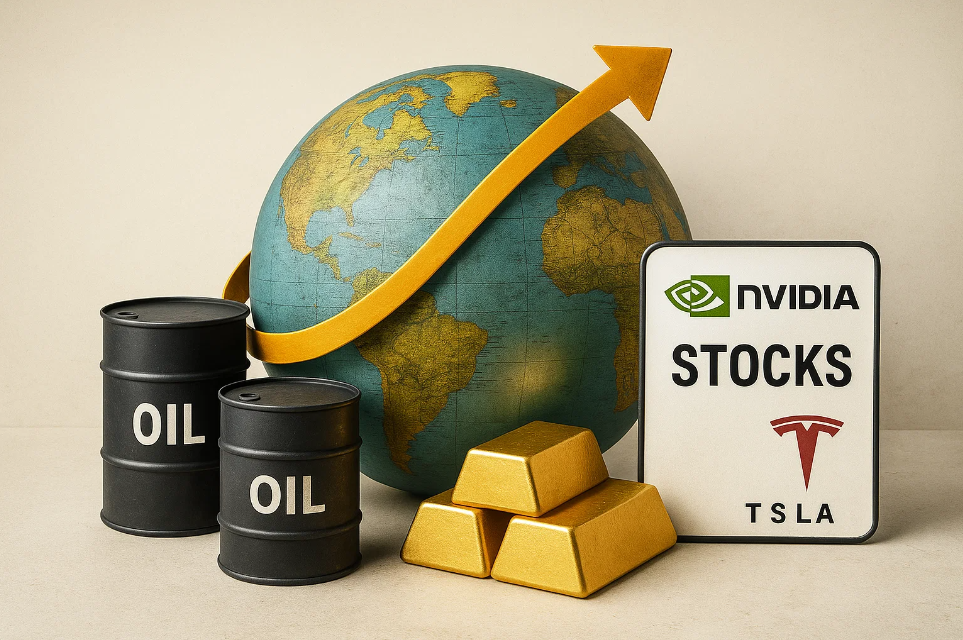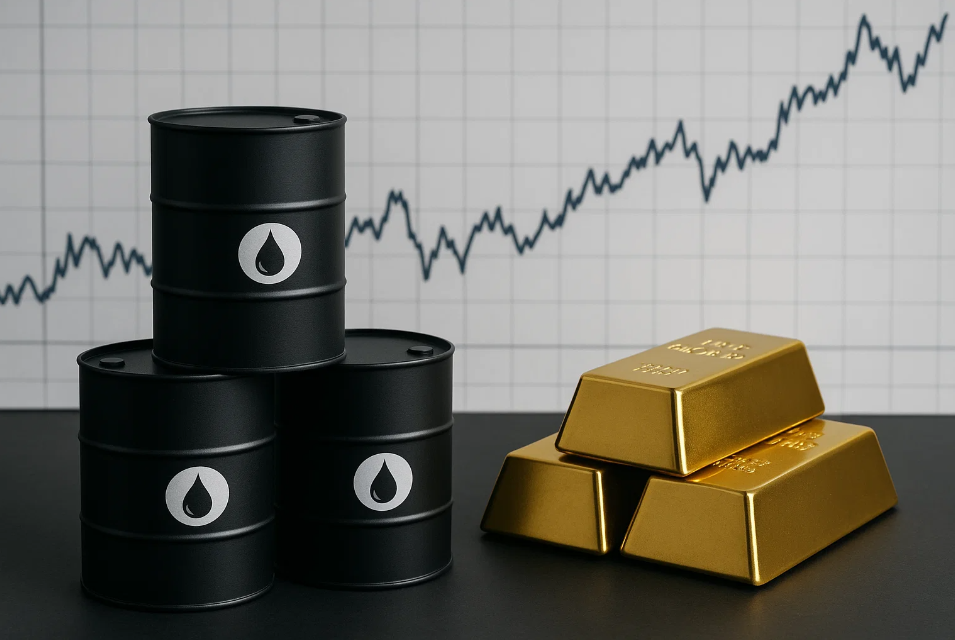
Geopolitical events usually have high impacts across financial markets. They can cause prices to move fast and unpredictably. Yet, what are these events actually? They can include conflicts in key regions, trade tensions, sanctions, and such. The results of these events affect the way investors and traders approach gold, oil, and stock markets.
Knowing the impact of geopolitical developments on these assets can help you prepare for volatility and identify potential opportunities while managing risk. Gold usually becomes a safe haven asset, oil prices react to supply disruptions, and stock markets react to changes in investor sentiment and economic outlooks.
In this article, we will explore why geopolitical events move markets, how they specifically impact gold, oil, and stocks, and what traders and investors should consider during uncertain times.
Since geopolitical events can create uncertainty, the reaction of the markets usually happens strongly. Investors and traders try to price in quickly during these times. Supply chains, trade routes, and expectations for economic growth can all be impacted by events like wars, trade disputes, sanctions, or political unrest.
When there's uncertainty, investors tend to move away from riskier assets. They seek safer options or adjust their positions to protect their portfolios. This shift in behavior often affects demand in markets like gold, oil, and stocks, and causes noticeable changes in prices.
Geopolitical events can affect everything from currency values to inflation expectations and interest rate outlooks, all of which play a role in how markets are priced. For instance, a conflict in a key oil-producing region might push oil prices higher, raise concerns about inflation, and add to market volatility. As a result, investors often reassess their positions in both equities and commodities.
Gold has been considered a safe haven for times like thse for a long time. When there are conflicts or political tensions, gold often becomes a go-to choice for investors looking to protect their wealth. As more people move their money into gold, demand increases and prices tend to climb.
During wars, sanctions, or financial turmoil, gold often draws interest from buyers trying to shield themselves from currency drops or instability in other markets. It has been a reliable asset for a long time. Its value makes it a popular choice when confidence in traditional investments starts to fade.
Traders and investors can be afraid of geopolitical events. The danger and casulties aside, they can lead to inflation. When it happens, oil prices can rise or supply chains can get affected. Gold demand however, increases during these periods as a hedge against inflation.
Gold may not always deliver profits in every crisis, but its history as a safe-haven asset makes it a valuable part of many investors’ strategies when trying to manage risk during geopolitical uncertainty.

Oil prices can easily get affected by geopolitical events, especially the ones tat happen at the producing regions. Prices can be affected from even the potential for disruptions, as traders may expect a decrease in supply or an increase in transportation risks.
Sometimes there can be problems in key oil producing regions that can affect supply. The examples include conflicts in the Middle East, sanctions on major producers like Russia, or political instability in countries like Venezuela. These occasions can lead to concerns about global oil supply and oil trading. Given how much of the world's oil is produced in these areas, any threat to production or export routes has the potential to raise prices.
Take the Strait of Hormuz for example. It's an important passage for global oil shipments, and whenever there's a risk of it being closed off or tankers facing threats, oil prices tend to rise quickly. In the past, sanctions on countries like Iran or Russia have also limited supply expectations, pushing prices up. Conflicts in oil-producing areas of Africa or South America can lead to production disruptions too, adding more pressure to an already tight market.
When supply concerns grow, governments may release oil from their strategic reserves to ease market pressure. This can offer short-term relief, but it doesn't fix the underlying issues. If tensions persist, prices often remain high. Geopolitical events can also affect demand in a less direct way. Political uncertainty can slow global economic growth, which can reduce oil demand and affect price movements.
Stock markets react to geopolitical events quickly. This action causes changes in investor sentiment and expectations for economic growth. Markets often take a hit when tensions rise, as investors tend to pull back from riskier assets. How each sector responds can vary based on the situation. Some may hold up well or even benefit, while others are more vulnerable and feel the pressure more quickly.
Risk-Off Sentiment
When there is a geopolitical crisis, many investors become more cautious and start moving out of stocks. When people try to move away from risk, it can result as broader market declines. Major indexes often experience sell-offs when investors worry that a crisis could hurt the economy, disrupt trade, or push inflation higher. These concerns lead many to reduce their exposure to risk, which puts downward pressure on the broader market.
Sector Impacts
Different parts of the market react in different ways during these events:
Regional Effects
Tensions in a specific area usually hit local markets hardest. For instance:
Global Connections
Even when an event starts in one corner of the world, it doesn’t stay there for long. However, today’s supply chains are deeply connected. So a conflict or disruption in one region can quickly affect businesses and markets around the globe. These ripple effects can be seen in stock movements, currency shifts, and inflation expectations across the board.

Geopolitical events often trigger price moves across gold, oil, and stocks, but these assets do not always move in the same direction. Understanding how markets correlate during crises can help traders and investors position themselves effectively.
Gold often shows an inverse relationship with stock markets during geopolitical tensions. As stocks decline due to risk-off sentiment, gold may rise as investors seek safety.
Rising oil prices put pressure on stock markets. During geopolitical events, oil prices can increase inflation concerns and raise costs for businesses. However, energy sector stocks may benefit from higher oil prices, creating mixed reactions within the market.
Both assets may rise during geopolitical crises:
Gold may rise further while oil demand eventually declines if rising oil prices slow global economic growth. This shows how their relationship can change based on the length and type of the crisis.
Geopolitical events can create complex market reactions:
Geopolitical events often bring increased volatility to markets. They can create both opportunities and risks for traders and investors. Prices can move sharply, spreads may widen, and unexpected news can trigger sudden reversals.
There can be large price swings in the markets during geopolitical crises. For traders, this volatility can create opportunities to gain from short-term moves. Yet, it also increases the risk of losses if trades are not managed carefully.
When there is high uncertainty in the market, the gap between buying and selling prices can get wider. This can increase trading costs. Rapid price movements can lead to slippage, where trades are executed at prices different from those expected.
There are times markets open with price gaps on weekends or during major news releases. This can be problematic for traders who hold positions overnight or during market closures.
To trade effectively during geopolitical volatility:
Governments sometimes release oil from their strategic reserves to balance supply issues and keep prices from rising too fast. This can offer some short-term relief, but if the geopolitical tensions causing the problem don’t go away, oil prices may keep climbing anyway.
Central banks sometimes shift their foreign exchange reserves when geopolitical events shake up currency stability. For example, if a major currency is hit by sanctions or caught up in a conflict, they might buy more gold to protect their assets and reduce exposure to the risk.
Central banks can lower interest rates to support economic growth during crises. This action affects stock markets and potentially increases gold demand as lower rates reduce the opportunity cost of holding gold.
In some cases, currency interventions may occur to stabilize exchange rates, which can indirectly affect commodity prices and stock markets linked to trade flows.
Government and central bank actions can influence investor sentiment:
Geopolitical events can rattle the markets and impact gold, oil, and stocks in different ways. Gold usually sees more interest as a safe haven, oil prices react to supply risks in key areas, and stocks move based on changes in investor sentiment and the broader economic outlook.
These events can cause volatility and uncertainty, but they also create opportunities. If you understand what’s driving the moves, you’re in a better position to respond calmly and make informed decisions.
Why does gold often rise during geopolitical crises?
Gold is seen as a safe haven, attracting investors looking to protect their wealth during uncertainty and currency volatility.
How do conflicts in the Middle East affect oil prices?
Conflicts can threaten supply routes and production in this key region, often leading to price increases due to anticipated shortages.
Do stock markets always fall during geopolitical events?
Not always. While uncertainty can cause declines, some sectors like defense may benefit, and markets may recover if tensions ease.
Can central bank actions offset the impact of geopolitical crises?
They can influence market sentiment through interest rate changes, currency interventions, or reserve adjustments, but deep crises may continue to drive volatility.
Should I trade during geopolitical volatility?
Trading during these periods requires caution, smaller positions, and strong risk management due to higher volatility and unexpected price moves.
Would like to learn how to look financial markets from a different angle? Then keep reading and invest yourself with ZitaPlus.